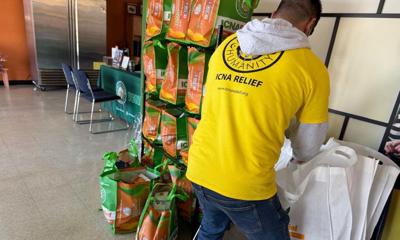More than 3,000 immigrants who are in Missouri legally but are not citizens are expected to lose eligibility for the nation’s largest federal food assistance program this month due to the massive tax and spending bill President Donald Trump signed into law in July, according to the state’s Department of Social Services.
Another 6,000 could lose benefits in the coming months.
The bill disqualifies refugees, people who have been granted asylum and other humanitarian immigrants from receiving benefits through the Supplemental Nutrition Assistance Program, or SNAP.
As a result, families who have already missed November SNAP payments due to the ongoing federal government shutdown are staring down reduced food budgets that will outlast the current gridlock in Washington.
People who lose eligibility because they are in an affected group cannot re-qualify for SNAP until they have held lawful permanent residence, commonly known as a green card, for 5 years, said Chris Moreland, director of communications for the state’s social services department.
Syed Yousuf Hussain, case manager for ICNA Relief Missouri, a Muslim faith-based charity in St. Louis, said the center’s food pantry has seen a 20% increase in attendance since SNAP payments were suspended on Nov. 1. Of the 90 families the food pantry serves each month, Hussain said, most are refugees, from countries including Afghanistan, Syria, the Democratic Republic of the Congo, Venezuela and Colombia, but the food pantry is open to anyone in need, regardless of their immigration status or religion.
“Many families, they’re suddenly left with a big question mark, how to cope up with the situation when suddenly the benefits have been drastically reduced,” Hussain said.
Joan Kelly, director of strategic partnerships at Jewish Vocational Services of Kansas City, a nonprofit that aids refugees, said she expects 170 of the families her organization serves to lose benefits. Of these, she said 78% have at least one working family member and 75% have children.
“In a family that is working, and working really hard, these are really challenging conversations that we are having with folks already to say, ‘I don’t know how we’re going to make your budget work,’” Kelly said. “You’re already working. Your wife is working. You can’t really just walk in and say, ‘Hey boss, I lost my SNAP benefits. Can I get a raise?’”
Members of these groups have long been the exception to federal restrictions on immigrants’ access to safety-net programs.
Adults living in the U.S. without legal status are not eligible for SNAP, though they can apply and get benefits for members of their household who meet requirements, such as children born in the U.S.
Since 1996, federal law has required most immigrants with green cards to wait 5 years before they can qualify, even if they meet all other requirements applied to U.S. citizens.
Adriana Cadena, executive director of Protecting Immigrant Families, a national coalition of groups that advocates for low-income immigrants, said the new exclusions mark a departure from longstanding U.S. policy.
“In the past, there would be this sort of division among different types of immigrants in this country,” Cadena said. “Right now, the attack is on everyone.”
A key tool for self-sufficiency
Advocates said that while many refugees are eager to support themselves and their families without assistance, SNAP is a key tool for clients to meet basic needs during their early days in the U.S.
“Some of them are just gung-ho, ‘I don’t want any of this orientation stuff. Just get me a job. I want to support my family,’” Paul Costigan, state refugee coordinator at the Missouri Office of Refugee Administration.
Hussain said that in addition to food, the ICNA center in St. Louis provides English language and financial literacy courses, resume and job interview support, and mental health services. ICNA Relief USA provides a broader array of services throughout the country, including disaster relief, transitional housing and support for students.
“One can understand when somebody is coming here in the beginning, much more support is needed,” Hussain said, “but we try our best to make them fully self-reliant as soon as possible.”
For some refugees still using SNAP, Kelly said, the prospect of going to a food pantry after taking steps toward self-sufficiency is demoralizing.
“We have clients that have said, ‘I’ve stood in line for food my entire life. The thought of going to a pantry and standing for food again is untenable,’” Kelly said.
Changing eligibility during the shutdown
Baylee Watts, media director for the state’s social services department, said in an email that 3,651 individuals are expected to lose SNAP benefits because they belong to one of the impacted groups. Another 6,052 could lose eligibility after further examination of their cases.
The department has been updating its systems during the government shutdown to apply SNAP eligibility changes.
Watts said the department is working on implementing the new eligibility rules for refugees and other humanitarian immigrants in accordance with guidance from the U.S. Department of Agriculture. Once the updates are complete, the department will notify impacted people and “issue the necessary adverse action notices.”
The changes will then apply to current recipients’ cases at their next annual recertification, or when they submit a change to the department, Watts said.
The federal law also excludes refugees, asylees and some other groups from eligibility for Medicaid, the nation’s health insurance program for low-income people, beginning October 2026.
Meanwhile, some advocates said it remains unclear which groups of humanitarian immigrants will lose eligibility for SNAP and how many families they work with will be affected.
Costigan said new restrictions may apply mostly to refugees who entered the country in late 2024 or January 2025.
New arrivals of refugees have all but halted since Trump suspended the U.S. Refugee Admissions Program in late January. Refugees must live in the U.S. for one year before they can apply for a green card.
“It may just be a small number of people who have come in over the last year who have not adjusted their status yet, because it hasn’t been the one year mark,” Costigan said.
Supporting families
Cadena, of Protecting Immigrant Families, said her group has been working since January to understand the Trump administration’s policy changes on immigration and who is still eligible to receive help.
“What are the actual changes?” Cadena said. “Because a lot of this as well is about creating fear in keeping people from not accessing services they are really eligible for.”
Cadena noted that households with children who are U.S. citizens can qualify for SNAP benefits, regardless of the status of their parents.
The state social services department confirmed this.
Watts said that when an individual loses eligibility due to membership in one of the affected groups, “the household would still receive benefits for members of the household that meet citizenship requirements.”
Hussain said that although he expects more families to visit the food pantry in the coming months, donations have increased, and the center is coordinating with local partners to reach more households and supplementing food distribution with meal deliveries.
“We are trying to support our clients in the best way possible, regardless of the legal situation,” Hussain said. “This is something secondary, but our primary objective is to support those families.”
















